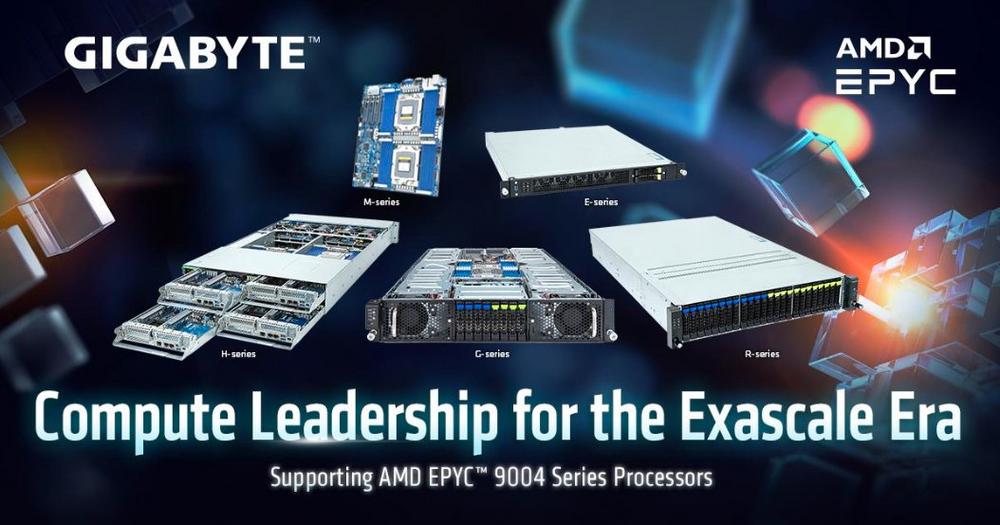GIGABYTE Delivers a Comprehensive Portfolio of Enterprise Solutions with AMD EPYC™ 9004 Series Processors

Breaking News:
Kathmandu Nepal
Montag, Dez 23, 2024

AMD EPYC 9004 Series Processor
The new 4th Gen AMD EPYC processors feature substantial compute performance and scalability by combing high core counts with impressive PCIe and memory throughput. In terms of out of the box performance, AMD estimates found that 4th Gen AMD EPYC CPUs are the highest performing server processors in the worldi. With the advancement to 5nm technology and other performant innovations, the new AMD EPYC 9004 series processors move to a new SP5 socket. The new architecture leads the way to faster data insights with high performance and built-in security features, and this platform targets HPC, AI, cloud, big data, and general enterprise IT.
Leadership core performance, compute throughput, and advanced security features
Key Generational Technologies and Advancements:
GIGABYTE Enterprise Series
For the new generation of powerful AMD EPYC processors, all new GIGABYTE server motherboards are designed to support the full lineup of 4th Gen AMD EPYC processors from 16 to 96 cores. All boards have 24 DIMM slots in the E-ATX MZ33 and MZ73, which is 5mm taller than E-ATX. For GPU support, because GPUs using PCIe 4.0 are still at the cost to performance sweet spot and accelerators supporting PCIe Gen5 are not popular yet, GIGABYTE has created two MZ73 configurations. The LM0 has four expansion slots that are PCIe 5.0 x16, whereas the LM1 slots are PCIe 4.0 x16.
When it comes to the R-Series servers that take a more traditionally balanced configuration, other than the number of sockets, storage is the key differentiator. The new 1U and 2U servers offer support for 2.5” or 3.5” drives and vary on how many drives and what kind of storage protocol is supported. Notably, the R263-Z33 and R283-Z93 servers support two dual-slot GPUs.
For AI training and other workloads that need an extreme level of parallel processing, the accelerator-optimized G-Series shines for its ability to sustain dense GPU compute performance. The 2U G293 is also a dual socket system that supports eight GPUs (PCIe 4.0 x16 or PCIe 5.0 x8). Both systems use redundant power supplies that are titanium rated for the highest efficiency possible.
Multi-node servers for HPC and HCI are all about the right balance of CPU compute performance and storage capacity. The H273-Z80 supports the maximum number of 2.5” drives, up to twenty-four, in the front of the case. Each of the eight CPU sockets supports AMD EPYC 9004 processors up to 240W TDP. On the other end, the H273-Z82 supports eight CPUs with a 400W TDP and does so by increasing airflow by removing some drive bays and one of two low-profile slots. These options in the H-series allow users to select the ideal solution for deployment.
Contrary to traditional servers with a depth of 700-800mm, the E-Series take a minimal footprint approach, and one that makes it ideally suited far from the data center and located at the network edge to reduce latency. The E283 is the first E-Series server supporting dual sockets while the E263 and E163 support our users with single socket options, and notably the E263 supports two dual-slot accelerators, while the denser 1U E163 has FHHL slots.
“Faster generational throughput and compute-intensive workloads, including integer performance, continue to give our in-house design team the chance to shape and improve flexible solutions that are ready from day one,” said Alan Chen, AVP at GIGABYTE. “We have great confidence that our initial AMD EPYC-based portfolio will fit the bill for most, if not all our customers, and deliver exactly what they want while cutting the fat.”
“We designed 4th Gen AMD EPYC Processors to give our customers exactly what they said they needed, high performance, exceptional energy efficiency and low total cost of ownership,” said Ram Peddibhotla, corporate vice president, EPYC product management, AMD. “With the latest “Zen 4” architecture that incorporates modern security by design, 4th Gen AMD EPYC Processors are an outstanding choice for IT professionals looking to optimize their data centers for leadership performance while helping address environmental goals.”
Remote and Multiple Server Management:
As part of GIGABYTE’s value proposition, GIGABYTE provides GIGABYTE Management Console (GMC) for BMC server management via a web browser-based platform. Additionally, GIGABYTE Server Management (GSM) software is available for download on product pages. This software can monitor and manage multiple servers without requiring an additional license fee. GMC and GSM offer great value while reducing TCO and customer maintenance costs.
To submit a query: Contact GIGABYTE Sales
Follow GIGABYTE on Twitter: twitter.com/GIGABYTEServer
Follow GIGABYTE on Facebook: facebook.com/gigabyteserver
About GIGABYTE
GIGABYTE is an engineer, visionary, and leader in the world of tech that uses its hardware expertise, patented innovations, and industry leadership to create, inspire, and advance. Renowned for over 30 years of award-winning excellence in motherboards and graphics cards, GIGABYTE is a cornerstone in the HPC community, providing businesses with server and data center expertise to accelerate their success.
About Giga Computing
Giga Computing Technology is an industry innovator and leader in the enterprise computing market. Having spun off from GIGABYTE, we maintain hardware expertise in manufacturing and product design, while operating as a standalone business that can drive more investment into core competencies.
Giga Computing Technology Co., Ltd.
7F, 6 Baoqiang Rd., Xindian Dist.
231 New Taipei City
Telefon: +31 40 290 2071
Telefax: +49 (40) 253304-45
https://www.gigabyte.com/
![]()